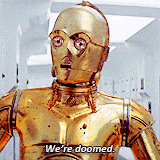AI and Humanity's Five Eternal Fears
Five fears have haunted us through all of history—and the current rise of artificial intelligence manages to trigger every single one at once.
1. “Technology will kill us all”
Every new invention was just about to wipe us out: from writing (“writing will ruin the art of rhetoric and memorization”) to the printing press (“books will drive us mad”) to high-speed travel at 30 km/h (“riding the train will burst our lungs”). New tech always seems to endanger everything and everyone.
2. “The Kids are not alright”
Complaints about the “depraved youth of today” stretch from ancient Rome through the Renaissance and straight into the 1960s (and the other direction too, though the boomers had more clout). Even Aristotle griped about luxury-loving youngsters with poor manners.
3. “Cultural change destroys our morals”
Philosophy, poetry, comics—pick your era, there’s always some new cultural fad that supposedly ends our moral backbone. Jazz corrupts the youth, rock ’n’ roll is evil, techno isn’t music, smartphones make you dumb, and so on.
4. “Foreign influences are harmful”
This cultural shift is supposedly even worse when it comes from abroad. “Nothing good ever came from the barbarians,” the ancient Greeks complained. German immigrants in the U.S. were treated like “guest workers” in Germany.
5. “Economic change means chaos”
The Luddites smashing automated looms knew it, and so did Charlie Chaplin on the assembly line in “Modern Times.” Globalization was going to put us all out of work anyway.
AI as a fear supernova
Here’s the twist: today’s AI debate is tangled up in all five fear narratives at once.
The AI apocalypse
This new technology will destroy humanity. It’s just a matter of when and how likely (expressed as p(doom)). Elon Musk warned that artificial intelligence is our greatest existential threat—even as he worked on his own Grok AI.

We’re doomed!
The end of education
Kids do their homework with ChatGPT (Homeworkalypse) and get mindlessly dumb. A MIT study even shows that LLMs change how our brains connect (though the main takeaway is that you remember your own words far better than what the LLM writes for you).
AI brings cultural decay
No more artists, musicians, or writers—just algorithmically generated mediocrity from giant probability matrices. Human creativity is done for. Artists are replaced by prompt engineers selling Midjourney paintings, streaming Veo blockbusters, and uploading Claude thrillers to Amazon.
The AI race
In Germany, this theme gets extra attention under the banner of “digital sovereignty.” The big frontier LLMs come from the USA or China, and even the hardware and training data rarely speak German. Sure, there’s Mistral AI from France and a few libertarian nerds running their models locally, but that’s it. At least we have an AI strategy (from 2018!) that was updated in 2020—two years before ChatGPT.
The jobcalypse
Of course AI will kill all our jobs (just like every major economic- industrial innovation before). Software developers and data scientists first, then lawyers and doctors, and finally humanoid robots to do the rest. Kevin Roose in the New York Times explains how AI is making life hard for new grads.
The flip side: hype denial also has a history
Don’t worry—claims that it’s all just a short-lived hype go back 3000 years too: “The cinema is little more than a fad,” “The horse is here to stay,” “There is no reason for any individual to have a computer at home,” or “Bitcoin is a fad.” Every change has someone shouting “Hype!”
What to do? Calm curiosity instead of panic
So here’s the provisional bottom line: we don’t know what’s happening. Just like Socrates, Tacitus, Da Vinci, or Charlie Chaplin didn’t know when they lived through times of change. Let’s keep the debate calmer while staying curious, experimental, and observant. Less “the world is ending” and more “let’s try it out and watch closely.”